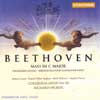Beethoven Mass in C
Beethoven’s radical rethink of the liturgy engenders a joyous reading from Hickox
View record and artist detailsRecord and Artist Details
Composer or Director: Ludwig van Beethoven
Genre:
Vocal
Label: Chandos
Magazine Review Date: 12/2004
Media Format: CD or Download
Media Runtime: 56
Mastering:
Stereo
DDD
Catalogue Number: CHAN0703

Tracks:
| Composition | Artist Credit |
|---|---|
| Mass |
Ludwig van Beethoven, Composer
Collegium Musicum 90 Ludwig van Beethoven, Composer Mark Padmore, Tenor Pamela Helen Stephens, Mezzo soprano Rebecca Evans, Soprano Richard Hickox, Conductor Stephen Varcoe, Baritone |
| Meeresstille und glückliche Fahrt, 'Calm Sea and |
Ludwig van Beethoven, Composer
Collegium Musicum 90 Ludwig van Beethoven, Composer Richard Hickox, Conductor |
| Elegischer Gesang |
Ludwig van Beethoven, Composer
Collegium Musicum 90 Ludwig van Beethoven, Composer Richard Hickox, Conductor |
Author: Edward Greenfield
Beethoven’s Mass in C, like Haydn’s late masterpieces and the Masses of Hummel, was written on commission from Prince Esterházy for the nameday of the Princess. Yet Beethoven’s contribution in 1807, unlike the others, was counted a failure. In a letter the Prince described the music as ‘totally ridiculous’. But why, when in every way this imaginative rethinking of the liturgy is inspired, overshadowed only by the later massive Missa solemnis? Maybe lack of rehearsal was to blame.
Paradoxically, Beethoven starts his setting more conventionally than Haydn did in his late masses. Where Haydn brilliantly gave his Kyries a symphonic flavour, Beethoven is devotional in a simpler, more innocent style. That is surely apt in a prayer for mercy, even if you note the Beethovenian modulations and dissonances, individual touches well brought out in Richard Hickox’s performance.
Hickox, with an excellent quartet of soloists, matches his achievement in his monumental set of the Haydn Masses, as well as the two Hummel Masses (12/02): these are full-blooded performances that bring out the exuberance of the inspiration. Where John Eliot Gardiner brings out the work’s drama with phenomenally crisp singing and playing on his Gramophone Award-winning recording, there is a an infectious joy to Hickox’s reading. The main contrast is that the choir of Collegium Musicum 90 is smaller than Gardiner’s Monteverdi Choir (24 singers – 8.5.5.6 – as opposed to 36 – 12.8.8.8) and that, with a closer focus and a marginally more intimate acoustic, crucially allows the words to be heard more clearly.
Throughout the liturgy one registers how Beethoven took nothing on trust, thinking afresh rather than relying on convention, as when the Credo’s first eight bars are quiet before the full outburst of affirmation from the choir, and the setting of ‘Et resurrexit’ begins with a baritone solo, not with a choral or orchestral outburst. The setting of ‘passus’ just before it has extra-ordinary intensity, just it does in the later Missa. Like Gardiner, Hickox’s brings out such points with clarity, with period forces making the music sound not just more vital but more modern.
Like Gardiner, Hickox couples the Mass with the lovely Goethe setting, Meeresstille und glückliche Fahrt, but he takes a more spacious view, heightening the contrast between the hush of the first, becalmed section and the exuberance of the final voyage. The Elegischer Gesang for choir and strings was written during the same period, in 1814, to commemorate the passing of a noble friend’s wife, in a simple, homophonic style; it makes a valuable supplement.
Paradoxically, Beethoven starts his setting more conventionally than Haydn did in his late masses. Where Haydn brilliantly gave his Kyries a symphonic flavour, Beethoven is devotional in a simpler, more innocent style. That is surely apt in a prayer for mercy, even if you note the Beethovenian modulations and dissonances, individual touches well brought out in Richard Hickox’s performance.
Hickox, with an excellent quartet of soloists, matches his achievement in his monumental set of the Haydn Masses, as well as the two Hummel Masses (12/02): these are full-blooded performances that bring out the exuberance of the inspiration. Where John Eliot Gardiner brings out the work’s drama with phenomenally crisp singing and playing on his Gramophone Award-winning recording, there is a an infectious joy to Hickox’s reading. The main contrast is that the choir of Collegium Musicum 90 is smaller than Gardiner’s Monteverdi Choir (24 singers – 8.5.5.6 – as opposed to 36 – 12.8.8.8) and that, with a closer focus and a marginally more intimate acoustic, crucially allows the words to be heard more clearly.
Throughout the liturgy one registers how Beethoven took nothing on trust, thinking afresh rather than relying on convention, as when the Credo’s first eight bars are quiet before the full outburst of affirmation from the choir, and the setting of ‘Et resurrexit’ begins with a baritone solo, not with a choral or orchestral outburst. The setting of ‘passus’ just before it has extra-ordinary intensity, just it does in the later Missa. Like Gardiner, Hickox’s brings out such points with clarity, with period forces making the music sound not just more vital but more modern.
Like Gardiner, Hickox couples the Mass with the lovely Goethe setting, Meeresstille und glückliche Fahrt, but he takes a more spacious view, heightening the contrast between the hush of the first, becalmed section and the exuberance of the final voyage. The Elegischer Gesang for choir and strings was written during the same period, in 1814, to commemorate the passing of a noble friend’s wife, in a simple, homophonic style; it makes a valuable supplement.
Discover the world's largest classical music catalogue with Presto Music.

Gramophone Digital Club
- Digital Edition
- Digital Archive
- Reviews Database
- Full website access
From £8.75 / month
Subscribe
Gramophone Full Club
- Print Edition
- Digital Edition
- Digital Archive
- Reviews Database
- Full website access
From £11.00 / month
Subscribe
If you are a library, university or other organisation that would be interested in an institutional subscription to Gramophone please click here for further information.




